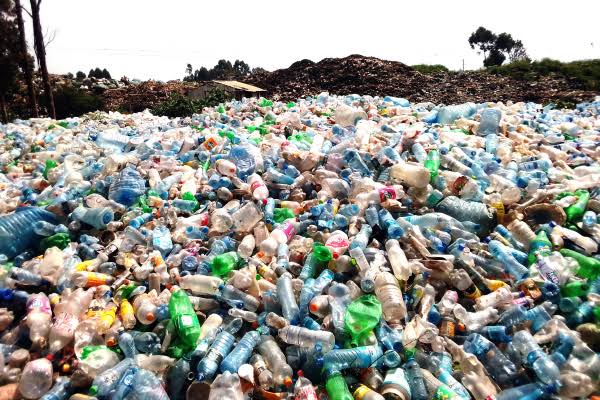
 Plastic dumping site
Plastic dumping siteAs plastic waste continues to clog urban streets and coastal neighbourhoods across Kenya, local communities are rising to the challenge—turning discarded bottles into a source of hope, dignity, and income.
Kenya currently produces an estimated 966,000 tonnes of plastic waste every year, a figure projected by the United Nations Conference on Trade and Development (UNCTAD) to reach five million tonnes by 2030.
In 2021 alone, the country imported more than 575,000 tonnes of raw plastic, valued at around KSh98.2 billion.
Despite government efforts—including the 2017 ban on single-use plastic bags and the 2020 extension of that ban to protected areas—plastic pollution remains a visible and persistent issue.
New regulations introduced last year aim to tighten controls.
The Environmental Management and Coordination (Management and Control of Plastic Packaging Materials) Regulations, 2024, now require plastic packaging materials to be declared at ports of entry.
More importantly, the law established an Extended Producer Responsibility (EPR) system, placing the burden of post-consumer waste management squarely on manufacturers and importers.
Producers are now required to design products that support reuse, recycling, and recovery, and to fund and operate collection schemes to manage the waste their products generate.
Yet with only 8–10 percent of Kenya’s plastic waste currently recycled, the gap between policy and progress remains wide.
Amid this challenge, individuals like Fred Olingo are offering practical, grassroots solutions.
In Garissa town, Olingo runs Taka ni Mali, a recycling initiative that is not only cleaning the environment but also creating livelihoods.
Inside his modest recycling plant, women and young men stream in carrying sacks filled with sorted plastic.
One of them is 65-year-old Kasembi Paul. Since 2018, she has been collecting plastic bottles—a venture that now pays for her family’s essentials and her daughter’s college education.
“On a good day I make up to KSh2,000; on slower days, around KSh900,” she says. “My daughter just finished Form Four and is now in college. All her fees come from this work.”
But it’s not always easy. “Sometimes we have to walk far because the plastics near town have been picked clean. Still, this work keeps young people busy and away from trouble,” she adds.
Olingo, who founded Taka ni Mali in 2016 in Nakuru, says he relocated to Garissa due to the high volume of plastic waste.
“Nakuru was difficult. It’s cooler and people don’t use bottled water as much,” he explains. “A friend suggested Garissa, where water scarcity means bottled water is widely used. That’s when things took off.”
As Kenya marks World Environment Day on 5 June, themed ‘Global Call to End Plastic Pollution’, stories like Olingo’s and Kasembi’s remind us that even the most discarded materials can be given new life—and in doing so, transform lives along the way.












